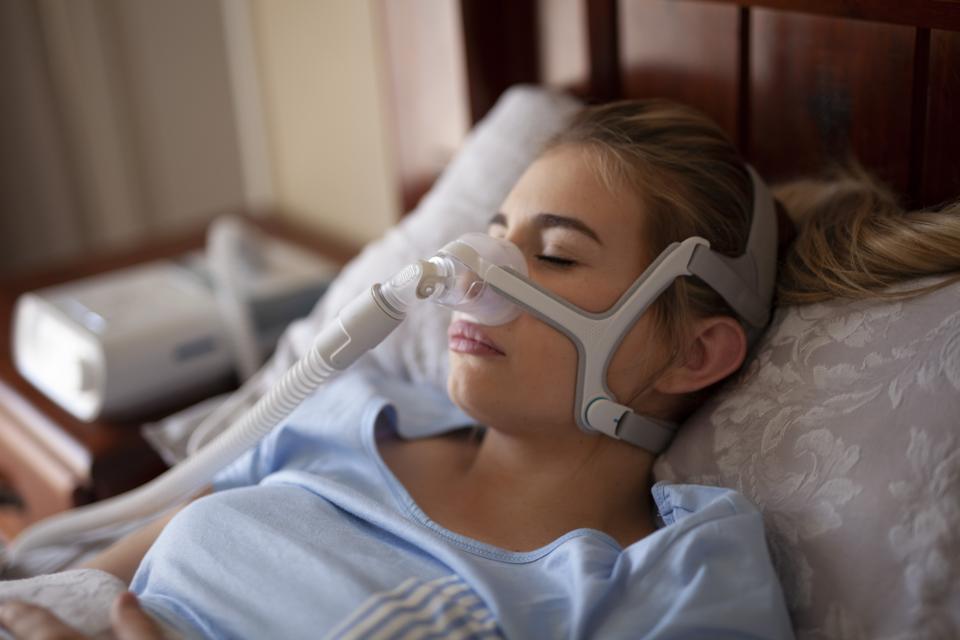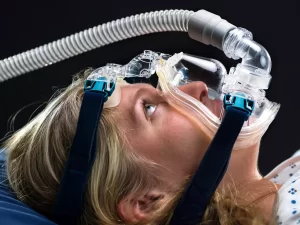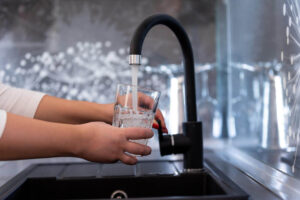CPAP machines are generally designed to be as quiet as possible to ensure they don’t disrupt sleep. Most modern CPAP machines operate at a noise level ranging from 25 to 30 decibels, which is comparable to the sound of a whisper or rustling leaves.
Here’s a comparison of CPAP machine noise levels to some other common sounds:
- 20 decibels: Mosquitoes
- 30 decibels: Whisper, quiet refrigerator hum
- 40 decibels: Normal conversation, library
- 50 decibels: Rain, dishwasher
- 60 decibels: Normal television
So, while some CPAP machines can be a bit louder than others, most are unlikely to disrupt your sleep or the sleep of your bed partner. In fact, some people find the gentle white noise produced by a CPAP machine to be soothing and helpful for falling asleep.
Some newer models may be even quieter. It’s important to note that perceived loudness can vary depending on the specific model and the acoustics of the room where it’s used.
The noise level might be affected by how well the machine is maintained, as a dirty or clogged filter can increase noise.
Table of Contents
What Can Make a CPAP Machine Louder?
Several factors can contribute to a CPAP machine becoming louder over time or emitting more noise than expected:
Age of the Machine
Older CPAP machines may become noisier as they wear out. Components such as motors and fans can become less efficient and generate more noise.
Maintenance Issues
Lack of regular maintenance can lead to increased noise. This includes not cleaning or replacing the air filter, which can get clogged with dust and debris, forcing the machine to work harder and louder.
Leaks in the Mask or Hose
Air leaks from the mask or hose can cause a whistling or whooshing sound. Ensuring a good fit and checking for any damage to the mask or hose can help reduce these noises.
Incorrect Settings
If the pressure settings are not adjusted correctly for the user’s needs, it can lead to unusual sounds. It’s important to follow the healthcare provider’s recommendations and have the machine checked if it seems to be louder than it should be.
Damaged Equipment
Wear and tear on the machine’s components, such as the motor, bearings, or the hose, can lead to increased noise levels. Regular checks can help identify and rectify such issues.
Vibration
The surface on which the CPAP machine is placed can amplify noise. Placing it on a stable, vibration-absorbing surface can reduce noise.
Humidifier Problems
If the CPAP machine has an integrated humidifier, problems with the humidifier, such as low water levels or malfunctioning components, can also contribute to noise.
Addressing these issues can often reduce the noise level of a CPAP machine, making it more comfortable to use. Regular maintenance, proper setup, and using the machine according to the manufacturer’s instructions are key to ensuring it operates quietly and efficiently.
How Can You Prevent Noisy CPAP Machine?
To prevent your CPAP machine from becoming noisy, you can take several proactive steps:
Regular Maintenance and Cleaning
Follow the manufacturer’s guidelines for cleaning and maintaining your CPAP machine. This includes regularly cleaning or replacing the air filter, which can become clogged and cause the machine to work harder and louder. (Read more: How To Clean A CPAP Machine)
Check for Leaks
Regularly inspect the mask, tubing, and connectors for any signs of wear or damage. Leaks can cause whistling or whooshing sounds. Ensure that the mask fits properly and is not too tight or too loose.
These also prevent rainout and other CPAP machine issues. Read more: What Is CPAP Rainout and How Can I Prevent It?
Make Sure to Properly Setup Your CPAP Machine
Your CPAP machine should be set up according to the manufacturer’s instructions. Incorrect settings can cause the machine to be louder than necessary.
Use a Dampening Mat
Place your CPAP machine on a sound-absorbing mat or a piece of thick fabric to reduce vibration noise.
Regularly Check and Replace Parts
Components like hoses, masks, and filters wear out over time. Replacing these parts as recommended by the manufacturer can prevent noise caused by worn-out equipment.
Ensure Correct Water Level in Humidifier
If your CPAP machine has a built-in humidifier, make sure it’s filled to the correct level. Too much or too little water can cause noise.
Choose a Quiet Model
If you’re in the market for a new CPAP machine, look for models that are known for being quiet. Check the decibel level, which should be listed in the product specifications.
Consult with a Specialist
If your machine starts to make unusual noises, consult with a healthcare provider or a CPAP specialist. There might be specific issues with your machine that require professional attention.
Tweak Your Room Environment
Consider the acoustics of the room where you use the CPAP machine. Soft furnishings can absorb sound and reduce noise.
Use a Hose Stand
A hose stand can prevent the hose from kinking or bending, which can sometimes cause noise.
By following these tips, you can help ensure that your CPAP machine operates quietly and efficiently, providing you with a good night’s sleep without unnecessary noise.
FAQ
Why Is My CPAP So Loud?
Your noisy CPAP could be due to a leaky mask, letting air escape and whistling. Check for gaps and adjust the fit, or try a different size. A clogged filter forces the motor to work harder, so clean or replace it regularly. Loose connections in the hose can also cause whistling. Consider the machine’s age – older models get louder. Place it on a soft surface to absorb vibrations, and try white noise to mask the sound. If the noise persists, consult your doctor or equipment supplier.
Are CPAP Machines Loud?
Most modern CPAP machines are whisper-quiet, around 30 decibels, comparable to a refrigerator hum. However, several factors can make yours noisy: leaks in the mask causing whistles, a clogged filter straining the motor, or loose hose connections. Age also plays a role, as older models tend to get louder. If the noise bothers you, try troubleshooting these issues or consult your doctor for further advice. Remember, a good night’s sleep is essential, so don’t let noise disrupt your CPAP therapy!




